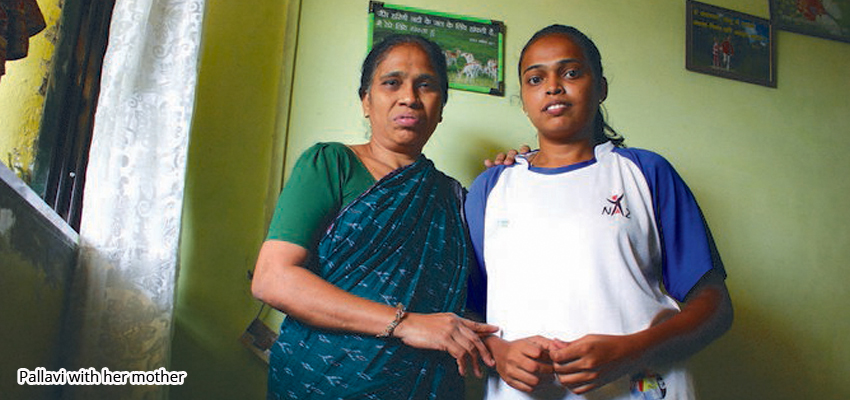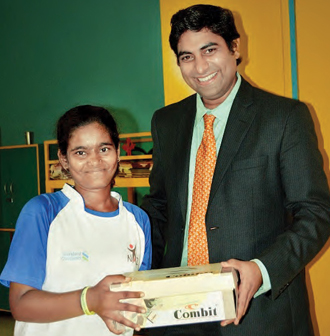Pallavi’s inspiring journey from Ambernath to New York

"Everyone has inside of her a piece of good news. The good news is that you don’t know how great you can be! How much you can love! What you can accomplish! And what your potential is!"
- Anne Frank
"I don’t think I enjoyed school a lot. I used to have classes and because I am tall, my teachers would make me sit in the last row. I barely got attention and I wasn’t altogether very happy"
- Pallavi Gaikwad
The township of Ambernath is a far-flung, lower-middle-class place that probably has just one thing in common with the glitzy Mumbai - the suburban local that connects it to the city’s train terminus. At Ambernath, streets do not exist and the water supply is unreliable at best. Dilapidated buildings with forlorn playgrounds pass off for schools and colleges. An occasional expensive SUV, probably belonging to a local politician, drives by, over the non-existent roads making heads turn. Men loiter around aimlessly and women go about their daily chores, heads hung low, trying to ignore prying eyes. Amidst this picture of hopelessness, Pallavi Gaikwad stands tall. Her thumbs are hooked around her backpack strap. She’s in her tracksuit, which makes her stand out even more than she otherwise would have thanks to her height (a little over 5.5). Even so, Pallavi Gaikwad seems at ease. In New York, at the Clinton Global Initiative, Pallavi will speak on behalf of her NGO. She will narrate her own story about how she fought all odds and stood on her feet.
Pallavi Gaikwad is a product of the Goal Program, an initiative Standard Chartered Bank runs in partnership with local and international NGOs, that uses team sports-in this case, netball-as a vehicle for social inclusion. Its participants are between the ages of 12 and 19, and come from families that earn less than 150 a day.
On completing the programme, the girls are invited to then Pallavi Gaikwad with her coach to become trainers themselves, thus helping scale and replicate the model. They address young women on issues related to health and hygiene, peer pressure and financial literacy among others. They also encourage dialogue on topics that most haven’t discussed earlier-touchy issues such as menstrual cycles, sex and childbirth.
The Naz Foundation, with which Pallavi Gaikwad is associated, runs the program in Delhi, Mumbai and Chennai. When she appeared for an interview at Naz Foundation, she didn’t have the faintest clue of what she was getting into.
Naz was looking for netball coaches and had approached her through the Thane District Netball Association. She was one of the two girls to make it to the final round of interviews. “My coach told me they were looking for someone to teach netball. Netball is a team game and one that encourages you to work together, whether you like the person around you or not. It works as a good team-building exercise. It didn’t seem like a bad way to earn some money and so I went,” she says in Marathi, her mother tongue.
By then, Pallavi had changed a handful of colleges, failed in school once, forgone a year at college because she didn’t like it, and was spending most of her time playing sports while being registered for a distance education graduation course from the University of Mumbai. “I don’t think I enjoyed school a lot. I used to have classes and because I am tall, my teachers would make me sit in the last row. I barely got attention and I wasn’t altogether very happy,” she says.
"There have been cases when parents have complained to school authorities about what we’re teaching but, more often than not, when we explain to them the importance, they go satisfied"

Her mother Chhaya Gaikwad remembers her daughter being an angry child. “She didn’t think twice before hitting someone,” says her mother. Her father Jaywant Gaikwad died early, leaving her mom to fend for Pallavi, sister Archana and brother Bhushan. By now, the Gaikwads had moved into a three-room apartment that was an upgrade from the chawl (tenement housing) they stayed in. The living room is sparsely furnished. The only piece of furniture is a computer table. There are a few musical instruments lined up against one wall. This is the house where Pallavi spent the last ten years of her life. Perhaps not the most ideal environment to raise a child but it was the best the mother could offer.
Chhaya works in Mumbai’s municipal corporation offices and spends about three hours commuting to and from her workplace. Understandably, Pallavi gives the credit for her success to her mother. “What I am today is because of my mother,” she says. “She never once discouraged me from doing anything-be it fencing or netball or taking a year off from education, though she was clear that I must get my degree at all costs. Who I am, what I have become is because of my mother’s encouragement. She never once doubted us. The freedom she gave was complete and she always trusted us.”
What began as an unsuspecting netball coaching assignment was slowly turning into a life-changing experience. Just when Pallavi was getting comfortable with the idea of hearing ‘blasphemous’ things, she was told that she would soon have to start coaching young girls on the same topics. Pallavi along with her colleagues mostly conducts sessions in schools around the area where she lives. Here, she addresses young women who come from backgrounds similar to hers, but aren’t made aware of their potential. She speaks to them about the importance of hygiene, the effects of peer pressure, sex and childbirth. So far she’s trained over 2,000 young women.
“There have been cases when parents have complained to school authorities about what we’re teaching but, more often than not, when we explain to them the importance, they go satisfied. Some of them even request permission to sit in on some of the sessions to understand it themselves because often they have no idea too!”
When she isn’t teaching in schools and colleges, Pallavi goes to destitute homes whose inhabitants are largely women rescued from brothels. Her job at Naz has also taken her places she’d never have dreamt of going. Pallavi has travelled to Bangladesh to conduct a similar coaching camp for trainers in the country and to Amsterdam where she did a refresher course of sorts to be better equipped to train back at home. But it is her trip to the US that she holds closest to her heart.
“I never expected to be selected,” she says. “And now here I am trying to figure out what to wear and how to use a fork and spoon!” Now she has a few sets of Western formal clothes, and her wardrobe for the US will be a mix of both Western and Indian clothing. She admits that it has been unnerving. “But I know that I have to do a good job. This is what I have taught my girls and now it is my turn to be put to test. I better deliver.”